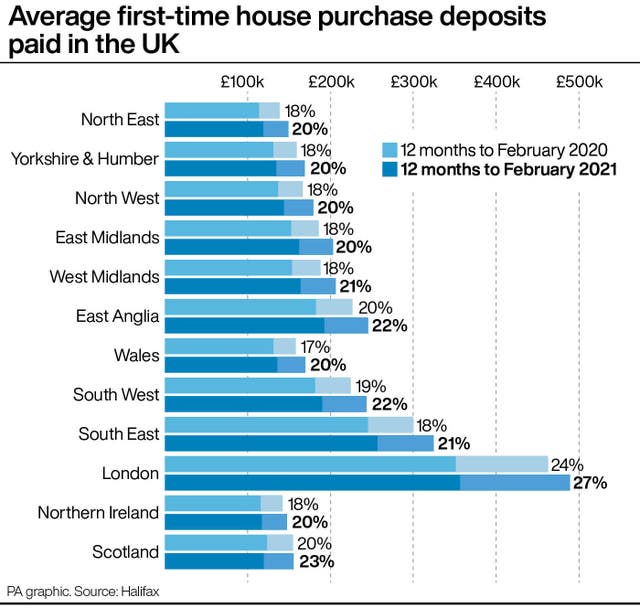
Richard Spurr 1am - 4am
22 March 2021, 10:44

The typical deposit that a first-time buyer needs to put down has increased in every UK nation or region over the past year, according to research.
First-time buyers face needing to find nearly £12,000 more for a deposit than they would have done a year or so ago, analysis has found.
The typical deposit that a first-time buyer needs to put down has increased in every UK nation or region over the past year and now averages nearly £59,000, according to the research from Halifax.
Halifax compared average first-time buyer deposit sizes in the 12 months to February 2020 with the 12 months to February 2021.
It found that, in London for example, the average deposit size being put down by people taking their first step on the property ladder had increased by more than £20,000.
In the 12 months to February 2020, the average deposit put down by first-time buyers in London was calculated at £111,321, but in the 12 months to February 2021 it was put at £132,685.

House price increases as well as requirements to put down a bigger deposit as a percentage of the house price mean that first-time buyers have needed to stump up more cash.
Across the UK, the average first-time deposit is now £58,986 or around
23% of the house purchase price, Halifax found, marking an £11,677 increase compared with an average deposit of £47,309 or 20% of the house purchase price a year ago.
Many low-deposit mortgages disappeared from the market last year amid concerns about the impact of the coronavirus pandemic on the wider economy.
Lenders will be taking part in a new 5% deposit mortgage guarantee scheme later this spring, which should boost the availability of ultra-low-deposit deals.
However, would-be home buyers will still need to make sure they meet lenders’ criteria to qualify, which could be difficult for some as the pandemic takes its toll on the jobs market.
Andrew Asaam, mortgages director at Halifax, said: “We know that lockdown restrictions have made it more practically challenging for those buying and selling, but the stamp duty holiday has helped drive record levels of mortgage approvals as those held back by lockdown race to make savings.
“Raising a deposit is still the biggest struggle for those looking to take their first step on to the property ladder.”
He continued: “We know that first-time buyers will benefit from steps that make a deposit more attainable and we’re committed to lending £10 billion to help people buy their first home this year.
“Additional support for high loan-to-value (LTV) lending such as introducing a new version of the Help to Buy mortgage guarantee scheme in April will help make owning their own home a reality for those who have no other way of making it happen.”
Here are average house prices in the 12 months to February 2020, according to Halifax, followed by the average first-time buyer deposit put down during this period and the deposit as a percentage of the house price. This is then followed by the figures covering the 12 months to February 2021:
– North East, £138,406, £24,582 , 18%, £149,183, £30,318, 20%
– Yorkshire and the Humber, £158,945, £28,108, 18%, £168,724, £34,341, 20%
– North West, £166,242, £29,668, 18%, £178,907, £35,465, 20%
– East Midlands, £185,226, £33,258, 18%, £202,803, £40,818, 20%
– West Midlands, £187,932, £34,041 , 18%, £205,995, £42,503, 21%
– East Anglia, £225,437, £44,034, 20%, £244,209, £52,984, 22%
– Wales, £157,493, £26,805, 17%, £169,111, £33,919, 20%
– South West, £223,634, £42,876, 19%, £243,244, £53,358, 22%
– South East, £299,365, £54,691, 18%, £324,446, £67,681, 21%
– London, £462,617, £111,321, 24%, £488,381, £132,685, 27%
– Northern Ireland, £142,049, £26,076, 18%, £147,303, £30,150, 20%
– Scotland, £154,509, £30,927, 20%, £155,193, £36,085, 23%